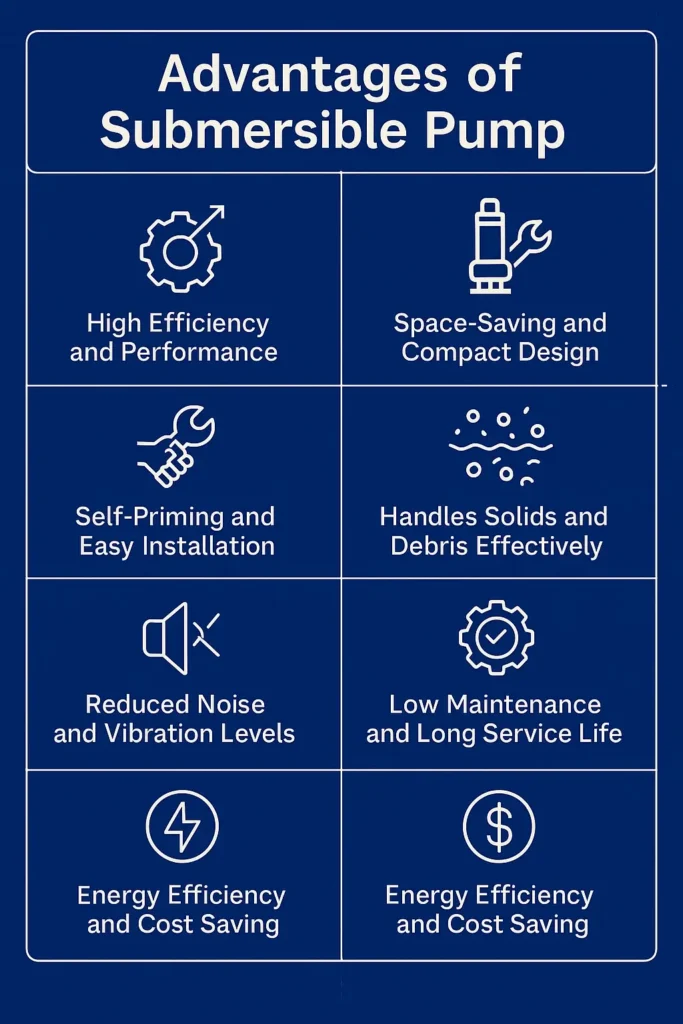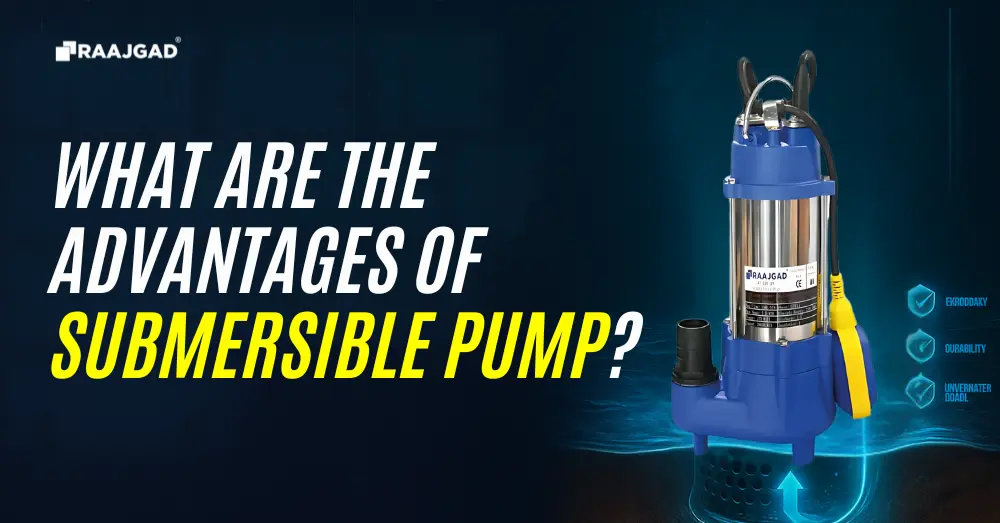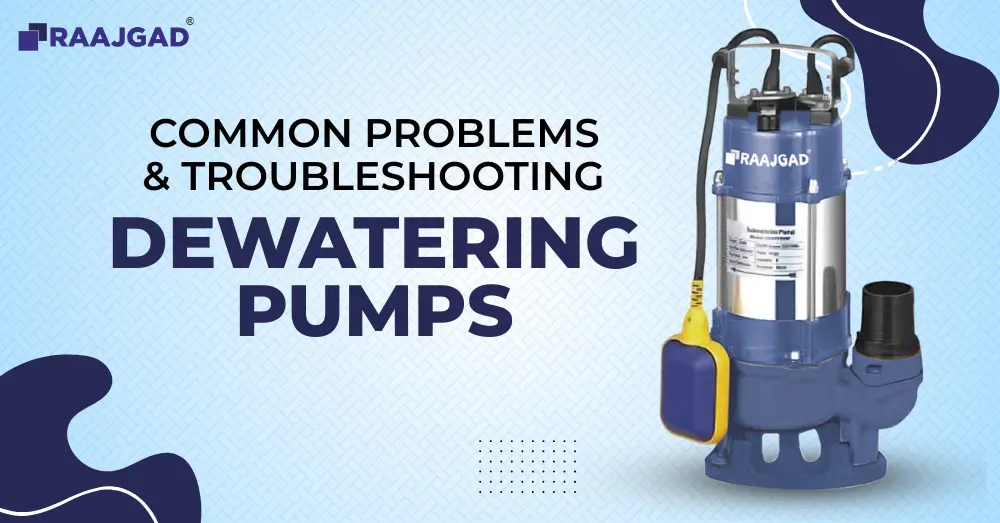Key Highlights:
Advantages of Submersible Pump?
- High efficiency with smooth water flow
- Compact, space-saving underwater design
- Quiet operation with minimal vibration
- Pumps solids, sewage, and debris effectively
- Durable, low-maintenance, long service life
Imagine a farmer struggling with a borewell, residents of an apartment frustrated by an empty water tank, and an engineer dealing with frequent clogs and loud vibrations from a traditional surface pump. However, these may seem like different problems, but they all have one sharp and simple solution – a good quality submersible pump.
With great efficiency and reliability, submersible pumps are a great innovation for dewatering. They simplify the task of dewatering in different industries and places and save time, effort, and money.
Through this blog, we’ll explore what submersible pumps are, the Advantages of Submersible Pump, and why they are preferred as a smart pumping solution
Introduction to Submersible Pumps
As the name suggests, a submersible pump is a specially designed water pumps that operates while being fully submerged in the water. They work differently from traditional water pumps, as they are placed directly within the water or any other liquid.
This pumped water provides several advantages, helping farmers, industrialists, and residents live a struggle-free life.
Types of Submersible Pumps
There are various types of submersible pumps available to pump water and other fluids from different depths:
- Borewell Submersible Pump – They are use for deep groundwater extraction in agriculture & homes.
- Openwell Submersible Pump – They are ideal for irrigation, industries & shallow water supply.
- Sewage Submersible Pump – Sewage Submersible Pump are designed to handle wastewater, sludge & solids.
- Dewatering Submersible Pump – Dewatering Submersible Pump removes water from construction sites & mines.
- Utility Submersible Pump – Used for daily uses like draining tanks, pools & flooded areas.
Advantages of Submersible Pump?

The innovation of submersible pumps has made lives easier, as it provides multiple advantages, such as self-priming, easy installation, and high efficiency performance.
Let’s learn about the key Advantages of submersible Pump, so that you can be aware of all the benefits.
- High Efficiency and Performance
Compared to old pumps, submersible pumps operate more efficiently as they reduce friction losses and promote more direct fluid movement.
- Space-Saving and Compact Design
The most beneficial part of owning a submersible pump is that they have a very compact design and remain submerged in the water. Therefore, they do not require any additional space, eliminating the need for large ground structures.
- Self-Priming and Easy Installation
Submersible pumps are very easy to install and set up. In addition, these pumps don’t have to be primed manually before every operation.
- Handles Solids and Debris Effectively
Specific submersible pumps, like sewage or slurry pumps, are specially designed to handle solid waste or debris. This makes them very useful for industrial work or mining operations.
Raajgad Pump provides all types of submersible pumps at a very affordable price, which can be used for different applications.
- Reduced Noise and Vibration Levels
Unlike traditional pumps, submersible pumps are installed under water, it blocks the noise and vibrations levels, ensuring your peace.
Most of the noise gets absorbed by the water, making them suitable for even low-noise areas like schools, hospitals, and offices.
- Versatile Applications in Various Industries
Submersible pumps can work under multiple conditions, whether it is domestic water supply, irrigation, sewage, wastewater pumping, or drainage of floodwater; they can do it all.
Being suitable for various applications becomes another notable Advantages of submersible pump.
- Low Maintenance and Long Service Life
As the submersible pumps are compact in size and are designed to be submerged in the water, they require very low maintenance. All of their moving parts are sealed and protected from dirt, dust, and damage, increasing longevity.
- Energy Efficiency and Cost Savings
Being cost-effective and having high energy efficiency are additional reasons why submersible pumps are preferred over traditional pumps. Lower electricity consumption provides long-term savings, helping businesses and households.
Environmental Benefits of Submersible Pumps
Apart from being technically advanced and cost-effective, there are various other environmental advantages of submersible pumps as well. Here’s a brief explanation:
- Submersible pumps use less energy and have a lower carbon footprint. Hence, they provide eco-friendly pumping operations.
- They treat and recycle water effectively in wastewater management. This results in less pollution in the environment.
- Whereas, in agriculture, these pumps save water and deliver efficient irrigation through underground sources with little waste. Overall, providing sustainability, efficiency, and technology altogether.
Conclusion
By simplifying wastewater management, submersible pumps stand out as a smart pumping solution. These pumps are low-maintenance, cost-effective, and an eco-friendly option for residents, farmers, and industrialists.
If you are looking for an affordable, cost-effective submersible pump that is easy to install and delivers performance, Raajgad Pumps is the right choice for you. Our pumps are suitable for residential, commercial, and industrial applications and offer a wide range of benefits, along with technical and environmental benefits.
For more information, visit https://www.raajgadpump.com/
FAQs
What is a submersible pump and how does it differ from other pumps?
Unlike other surface pumps, submersible pumps operate within the water and push the water upwards from within, making them more efficient.
Why are submersible pumps considered more efficient?
Since they work directly in liquid, they don’t need priming or dealing with the loss of suction, making them more effective.
Can submersible pumps handle solids and debris in water?
Yes, submersible pumps can handle solid wastes, dirt, or debris often present in the water.
What are the typical applications of submersible pumps?
Residential, Industrial, and Commercial applications like dewatering, irrigation, sewage, and well water extractions are some typical applications of submersible pumps.
Are submersible pumps noisy during operation?
No, while being submerged in the water, most of the operational sound gets absorbed by the water. This is one of the most beneficial Advantages of submersible pump.
What maintenance is required for submersible pumps to ensure long life?
Routine checkups for wear and tear, lubrications and clogs, and electrical inspections are enough to ensure the longevity of submersible pumps.


